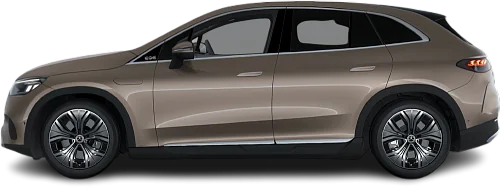Global EV Comparison: Tesla Model S 70 vs Mercedes EQE SUV 350+
Struggling to Decide? Let AI Help!
Your AI Summary Is Ready!
General Info
Since both vehicles have been discontinued, they are now only available on the used car market. You can get the Tesla Model S 70 (2016) for as low as €21998, while the Mercedes EQE SUV 350+ (2022-2023) begins at €64995.
The Tesla Model S 70 (2016) is a Liftback, whereas the Mercedes EQE SUV 350+ (2022-2023) is a SUV.
| Property | Tesla Model S 70 | Mercedes EQE SUV 350+ |
|---|---|---|
| Years of Production | 2016-2016 | 2022-2023 |
| Current Status | Discontinued | Discontinued |
| Country of Manufacture | Netherlands, USA | USA, China |
| Body Style | Liftback | SUV |
| Market Availability | EU, USA | EU |
| Price Europe (Used) | €21998 | €64995 |
| GCC Score | 6 | 6.7 |
Range and Efficiency
The Mercedes EQE SUV 350+ (2022-2023) boasts a greater real-world range, a larger battery, and superior energy efficiency compared to the Tesla Model S 70 (2016).
| Property | Tesla Model S 70 | Mercedes EQE SUV 350+ |
|---|---|---|
| Range (WLTP) | - Range (WLTP) | 594 km |
| Range (GCC) | 341 km | 468 km |
| Battery Capacity (Nominal) | 75 kWh | 100 kWh |
| Battery Capacity (Usable) | 69 kWh | 90.6 kWh |
| Efficiency per 100 km | 20.2 kWh/100 km | 19.4 kWh/100 km |
| Efficiency per kWh | 4.94 km/kWh | 5.17 km/kWh |
| Range and Efficiency Score | 5.3 | 7.2 |
Charging
Both vehicles utilize a standard 400-volt architecture.
The Mercedes EQE SUV 350+ (2022-2023) offers faster charging speeds at DC stations, reaching up to 170 kW, while the Tesla Model S 70 (2016) maxes out at 120 kW.
Both vehicles are equipped with the same on-board charger, supporting a maximum AC charging power of 11 kW.
| Property | Tesla Model S 70 | Mercedes EQE SUV 350+ |
|---|---|---|
| Max Charging Power (AC) | 11 kW | 11 kW |
| Max Charging Power (DC) | 120 kW | 170 kW |
| Architecture | 400 V | 400 V |
| Charge Port | Tesla Type 2 (Mennekes) | CCS Type 2 |
| Charging Score | 6.1 | 6.6 |
Performance
Both vehicles are rear-wheel drive.
The Tesla Model S 70 (2016) boasts greater motor power and accelerates faster from 0 to 100 km/h.
| Property | Tesla Model S 70 | Mercedes EQE SUV 350+ |
|---|---|---|
| Drive Type | RWD | RWD |
| Motor Type | IM | PMSM |
| Motor Power (kW) | 235 kW | 218 kW |
| Motor Power (hp) | 315 hp | 292 hp |
| Motor Torque | 440 Nm | 565 Nm |
| 0-100 km/h | 5.8 s | 6.7 s |
| Top Speed | 225 km/h | 210 km/h |
| Performance Score | 5.2 | 5.1 |
Dimensions
The Tesla Model S 70 (2016) has a longer body, while the Mercedes EQE SUV 350+ (2022-2023) stands taller, offering a more elevated ride. Their widths are almost identical, so both offer a similar amount of shoulder room.
The Mercedes EQE SUV 350+ (2022-2023) boasts a more extended wheelbase.
| Property | Tesla Model S 70 | Mercedes EQE SUV 350+ |
|---|---|---|
| Length | 4970 mm | 4863 mm |
| Width (with Mirrors) | 2189 mm | 2141 mm |
| Width (w/o Mirrors) | 1964 mm | 1940 mm |
| Height | 1445 mm | 1685 mm |
| Wheelbase | 2960 mm | 3030 mm |
Cargo and Towing
The Tesla Model S 70 (2016) features a larger trunk, but the Mercedes EQE SUV 350+ (2022-2023) offers greater maximum cargo capacity when the rear seats are folded.
A frunk (front trunk) is available in the Tesla Model S 70 (2016), but the Mercedes EQE SUV 350+ (2022-2023) doesn’t have one.
The Mercedes EQE SUV 350+ (2022-2023) has a towing capacity of up to 750 kg, whereas the Tesla Model S 70 (2016) is not officially rated for towing in the EU.
| Property | Tesla Model S 70 | Mercedes EQE SUV 350+ |
|---|---|---|
| Number of Seats | 5, 7 | 5 |
| Curb Weight | 2027 kg | 2430 kg |
| Cargo Volume (Trunk) | 745 l | 520 l |
| Cargo Volume (Max) | 1645 l | 1675 l |
| Cargo Volume (Frunk) | 60 l | - Cargo Volume (Frunk) |
| Towing Capacity | - Towing Capacity | 750 kg |
| Cargo and Towing Score | 5.5 | 7.7 |




